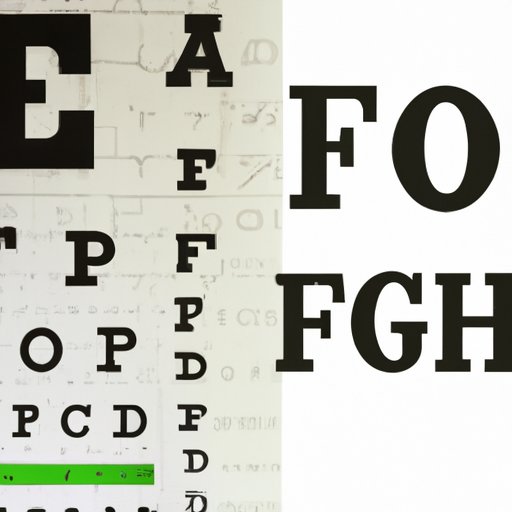Introduction
Your eyes are often thought to be the window to your soul, but did you know they can also provide valuable insight into your overall health? While many people focus on other aspects of their health such as diet, exercise, and mental wellbeing, it is equally important to pay attention to your eye health. In this article, we will explore the link between eye health and overall wellbeing and provide a comprehensive guide to what your eyes say about your health.

A Comprehensive Guide to What Eye Health Says About Overall Health
Your eyes are an integral part of your body, and any issues with your vision can indicate potential problems elsewhere. Many of the organs and systems in your body are connected to your eyes, so changes in your vision can be a sign of something more serious. Common conditions such as cataracts, glaucoma, and macular degeneration can be a warning sign of underlying health issues and can be indicators of diabetes, hypertension, or other chronic illnesses.
In addition, certain medications can cause changes in your vision, such as blurred vision or double vision. Many common drugs used to treat high blood pressure, depression, and arthritis can have side effects that affect your vision. If you experience any sudden changes in your vision, it is important to speak to your doctor as soon as possible.
How Your Eyes Reveal the State of Your Health
An eye exam is one of the most effective ways to detect underlying health issues. During an eye exam, your doctor will check for signs of disease or injury, assess your vision, and look for any abnormalities. This comprehensive evaluation can help to identify any potential health issues early on and provide a starting point for further investigation and treatment. Regular eye exams are especially important for those with family histories of diseases such as glaucoma, diabetes, and macular degeneration.
Your optometrist may also be able to spot signs of illness in your eyes. For example, yellowing of the whites of the eyes can be a sign of jaundice, which is caused by liver damage. Redness and swelling of the eyes can indicate allergies or infection, while dark circles beneath the eyes can be a sign of anemia or other nutritional deficiencies. It is important to discuss any concerns you have with your doctor.

The Role of Eye Exams in Predicting Overall Health
Having regular eye exams is essential in order to maintain good eye health and detect any underlying health issues. Not only do eye exams help to detect vision problems, but they can also uncover signs of serious illnesses such as diabetes and heart disease. Early detection of these conditions can make a huge difference in terms of treatment and outcome.
Eye exams can also be used to monitor the progress of existing medical conditions. For instance, if you have diabetes, your doctor may use an eye exam to track changes in your vision over time. This can help to determine whether your diabetes is under control and if any adjustments need to be made to your medication or lifestyle.

How to Spot Signs of Illness in Your Eyes
It is important to be aware of any changes in your vision and to seek medical advice if you notice any symptoms. Common symptoms of eye-related illnesses include redness, pain, blurred vision, floaters, flashes of light, and double vision. It is also important to look out for signs of infection, such as itching, discharge, or sensitivity to light.
If you experience any of these symptoms, or if you have any concerns about your eye health, it is important to seek medical attention as soon as possible. Your doctor can diagnose any underlying health issues and provide treatment if necessary.
Uncovering the Secrets of Eye Health and its Impact on Your Wellbeing
Maintaining healthy eyes is essential for overall health and wellbeing. Eating a balanced diet, wearing protective eyewear, and avoiding smoking are all important steps in keeping your eyes healthy. Additionally, getting regular eye exams is the best way to detect any problems before they become serious.
Living a healthy lifestyle is also beneficial for your eyes. Exercise helps to improve circulation, which in turn helps to keep your eyes healthy. Getting enough sleep is also important, as this gives the eyes a chance to rest and rejuvenate. Finally, reducing stress levels can help to reduce strain on the eyes.
Conclusion
Your eyes play an important role in your overall health and wellbeing. Being aware of any changes in your vision and having regular eye exams can help to detect any underlying health issues before they become serious. Additionally, living a healthy lifestyle and protecting your eyes from harm can help to keep your eyes healthy and ensure that you enjoy the best possible vision throughout your life.
In conclusion, your eyes can tell you a lot about your overall health and wellbeing. Taking care of your eyes is essential for maintaining good health, so be sure to get regular eye exams and follow a healthy lifestyle to keep your eyes healthy and your vision sharp.
(Note: Is this article not meeting your expectations? Do you have knowledge or insights to share? Unlock new opportunities and expand your reach by joining our authors team. Click Registration to join us and share your expertise with our readers.)
